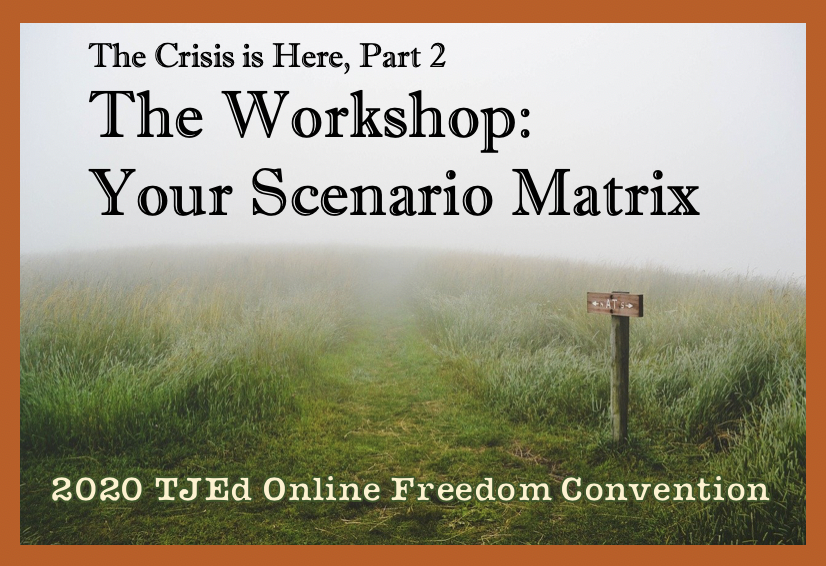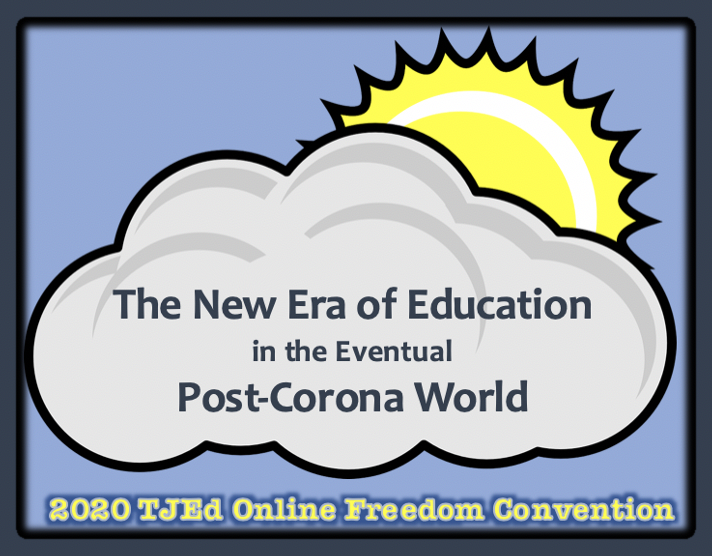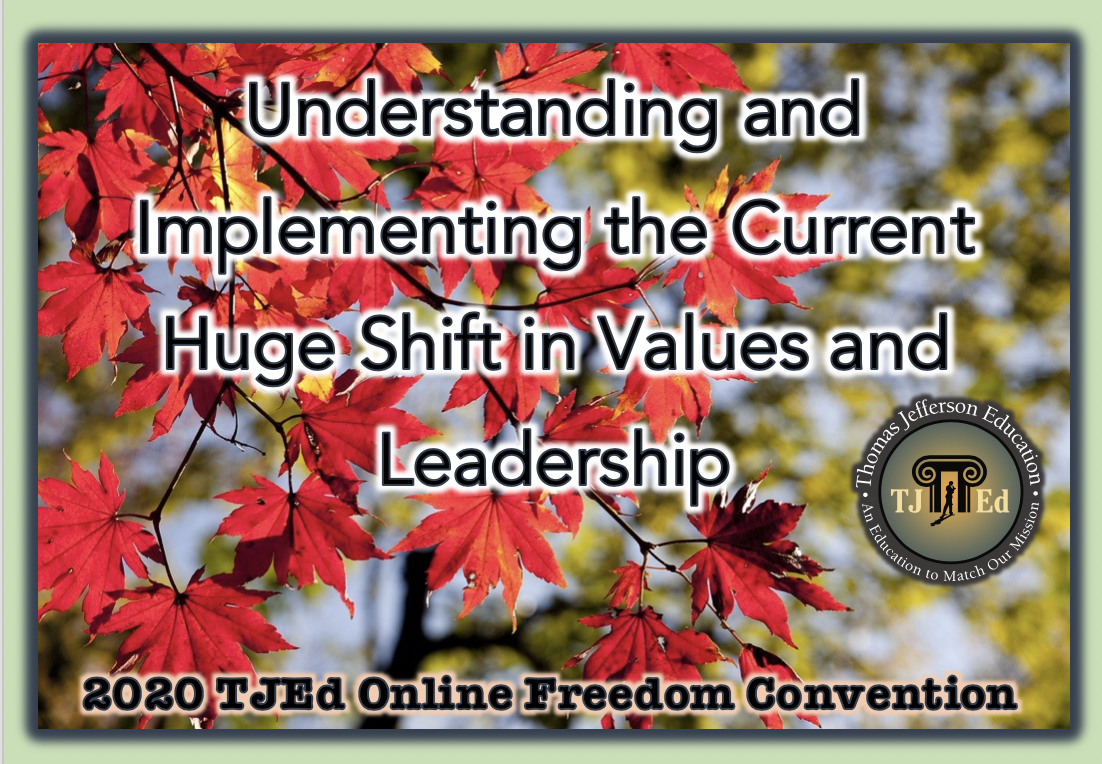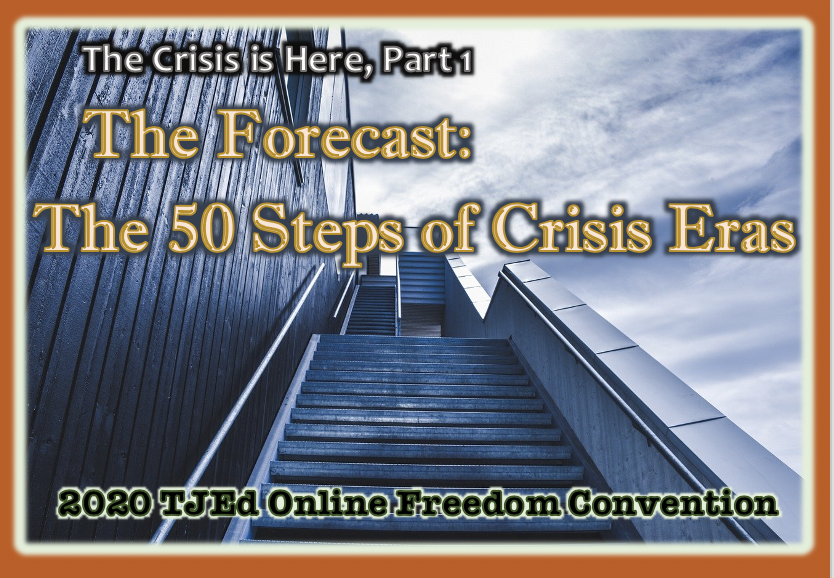What Every Parent (and Citizen and Leader) Should Know Right Now About College
August 1st, 2025 // 9:16 am @ Oliver DeMille
 I’ll be brief. College is changing rapidly, and parents, leaders and anyone who cares about education, freedom and our society needs to know about and understand these changes. Specifically, they need to know about 7 significant changes that are happening right now in the college-university-credential-career system. These are dramatically impacting our nation. Yet for some reason these changes are not effectively making it into the hands of all, or even most, parents, students and others who care about our society.
I’ll be brief. College is changing rapidly, and parents, leaders and anyone who cares about education, freedom and our society needs to know about and understand these changes. Specifically, they need to know about 7 significant changes that are happening right now in the college-university-credential-career system. These are dramatically impacting our nation. Yet for some reason these changes are not effectively making it into the hands of all, or even most, parents, students and others who care about our society.
Let’s change that, right here. The purpose of this post isn’t to promote college, or to discourage it. For some young adults, college is the perfect thing, and others may thrive more in an alternative to college. But without a knowledge of these changes, nobody is fully informed and therefore it can be much more difficult to make the best decisions for each individual student—or for citizens to understand how these changes are impacting our national future.
1. Changing Views on College
 A lot of people, including many higher education experts, are questioning if college is worth the cost anymore. According to Gallup, high confidence in college and universities is down to just 36 percent, after being much higher for the last five decades. (“American’s Confidence in Higher Education Remains at All-Time Low” The Epoch Times, Pan)
A lot of people, including many higher education experts, are questioning if college is worth the cost anymore. According to Gallup, high confidence in college and universities is down to just 36 percent, after being much higher for the last five decades. (“American’s Confidence in Higher Education Remains at All-Time Low” The Epoch Times, Pan)
For those planning on careers in licensed fields such as medicine, law, public-school teaching, etc., college is necessary. For many careers it is not. The key is to research the options and personalize for your
2. Rising Costs and The Six-Year Degree
The price tag of a college education has skyrocketed. The annual cost of tuition has increased more than 179 percent in the last 20 years (“How are college costs adding up these days and how much has tuition risen?” USA Today, Chernikoff; “Buyer Beware: Fees Skyrocket Costs of Higher Education” Forbes, Ladany), and the cost of housing and other living expenses went up almost twice as fast as tuition rose during this time.
The average annual cost of attending an in-state 4-year public college increased from $3,500 per year in 2001 to $9,750 in 2022 (Education Data Initiative, EducationData.org, Hanson). This does not include the higher room and board prices (now averaging $12,917 a year), higher costs for books and supplies (now $1,220 per year), and almost $4,100 per year in additional expenses for students not living at home. (Ibid.)
 In addition to these increases, the average time to graduate with an undergraduate degree is now 6 years, not the traditional 4 years of decades ago. (National Center for Education Statistics) With all these expenses added together, the average total cost for a person to get a public undergraduate degree is estimated at between $168,000 and quite a bit higher.
In addition to these increases, the average time to graduate with an undergraduate degree is now 6 years, not the traditional 4 years of decades ago. (National Center for Education Statistics) With all these expenses added together, the average total cost for a person to get a public undergraduate degree is estimated at between $168,000 and quite a bit higher.
In comparison, though there are differing statistics on this, the approximate total cost for an undergraduate degree twenty years ago was around $58,000. Note that these numbers are for public institutions; most traditional private schools cost a lot more. None of these numbers include the cost of interest on student loans. The numbers of young college graduates filing for bankruptcy recently hit the all-time high. (“Is College Education No Longer Worth It?” The Epoch Times, Ford)
College can be a long-term boost to the finances of graduates; but this is not guaranteed, though many people assume it is. Financial returns over a lifetime based on college degrees depend a great deal on the student’s college major and first job after graduation. Over 52 percent of recent college graduates are underemployed, meaning they work in a job that doesn’t require a college degree. (“Most college graduates face underemployment upon bachelor’s attainment,” The Thomas B. Fordham Institute, Murray) Just over a quarter of graduates in some majors end up working in their field. In the STEMM (Science, Technology, Engineering, Mathematics, and Medicine) majors and other licensed fields this number is typically much higher. The 6 year average time to get an undergraduate degree is a major change from the 4 year model of past decades.
3. The Real Numbers and the Skilled Careers
 Many parents and grandparents are wondering: What is college even like now, compared to when they attended? The old myths about college graduates receiving a million dollars more in lifetime earnings than non-college peers have been debunked, because too many factors weren’t included in that statistic, like the added costs of student loans and interest, the 4-7 fewer years those with degrees spend out of the work force, the extra savings and investing the non-college person makes for 4-7 extra years, the significant differences in lifetime earnings between different academic majors—and between males and females, and other demographic groups—etc.
Many parents and grandparents are wondering: What is college even like now, compared to when they attended? The old myths about college graduates receiving a million dollars more in lifetime earnings than non-college peers have been debunked, because too many factors weren’t included in that statistic, like the added costs of student loans and interest, the 4-7 fewer years those with degrees spend out of the work force, the extra savings and investing the non-college person makes for 4-7 extra years, the significant differences in lifetime earnings between different academic majors—and between males and females, and other demographic groups—etc.
In certain majors, college graduates still make a lot more than non-credentialed workers, but in many majors they don’t. And demographic trends are greatly increasing the demand for many non-college skilled trades and careers (e.g. construction managers, electricians, plumbers, business owners, dental hygienists, various types of therapists, technicians, and high-tech roles, etc.), a number of which are increasingly more lucrative than college degrees in many majors.
For example, consider the “Doctor vs. Plumber Debates” about which career path is wealthier at age 42. There are lots of articles and videos on this. Surprising and interesting. A little folksy at times, but important information.
4. Fewer Students and Cutting Programs
Because of population trends, starting in the fall semester of 2025 and for many years ahead the number of college-age students will be significantly smaller than it has been up to now (“A looming ‘demographic cliff’: Fewer college students and ultimately fewer graduates” NPR, Marcus), meaning major economic downturns in higher education. Decreasing enrollments have led hundreds of campuses to close recently, and this trend is accelerating.
 With the added reality of a lot more college-age students opting for non-college alternatives, even most large prestigious schools are cutting faculty, staff, majors and various programs—or planning to make significant cuts in the years ahead.
With the added reality of a lot more college-age students opting for non-college alternatives, even most large prestigious schools are cutting faculty, staff, majors and various programs—or planning to make significant cuts in the years ahead.
Parents and students must do their research before enrolling to make sure the programs you’re seeking will still be there in 5-7 years when most of this year’s new freshman will graduate and the number of students in college will be significantly decreased.
5. A Lot More Alternatives
There are numerous popular and increasingly accepted alternatives to on-campus college education, including multiple new forms and styles of learning, job and career training.
 For example:
For example:
- gap year projects
- apprenticeships
- internships
- certifications from high-tech online training programs—many of them 1 year to 18 months in duration rather than 4-7 years
- online certificate programs
- bootcamp learning
- community colleges
- tech schools
- online college course options like those offered by Coursera, EdX, Udemy, Khan Academy, Udacity and many others
- great college-level programs that emphasize learning and ignore credits and grades—like non-credit classes from Harvard, Yale, MIT, Standford, Hillsdale, and hundreds of other colleges and universities
- high-quality educational organizations that aren’t colleges or universities such as The Great Courses, MasterClass, TedX, SkillShare, HubSpot Academy
And of course, my favorite: TJEd Depth.
Also, the movement by certain billionaires and other educational leaders to help some of the best and brightest young adults skip college and build a business, partner on an entrepreneurial venture, or join a start-up team. Simultaneously, the alternative credentials (not degrees) sector is growing rapidly, and alternative non-college credentials are now accepted by many big organizations, including IBM, Google, Bank of America, Apple, Amazon, the U.S. Federal Government, a growing number of U.S. state governments, and many more. (“How Alternative Credentials are Shaping Modern Education,” Higher Education Today; “Organizations that Accept Alternative Credentials in Hiring,” Google AI Overview; “The Rise of Alternative Credentials in Hiring,” SHRM.org)
Many experts and organizations now promote new “post-industrial-age” credentialing systems not based on degrees but rather on proven competencies, knowledge, experience and skills. This trend is increasingly known as the “skills first” model.
6. Woke-ism and the Shadow Curriculum
 Left-leaning political activism on most campuses is real and deeply concerning. The number of young adults from homes with traditional family values, pro-faith beliefs, and/or conservative views who are now adopting leftist, anti-family, anti-morality and/or anti-faith perspectives and even aggressively going “woke” during their college years is alarming.
Left-leaning political activism on most campuses is real and deeply concerning. The number of young adults from homes with traditional family values, pro-faith beliefs, and/or conservative views who are now adopting leftist, anti-family, anti-morality and/or anti-faith perspectives and even aggressively going “woke” during their college years is alarming.
A number of experts are concerned that a major focus of many colleges and universities in recent years seems to have shifted to things happening outside the classroom: protests, political arguments, shouting down visiting speakers (on campus but also in classes), mass walk-outs from classes and assemblies, protestors physically stopping students from going to classes, assaults based on political or religious views, etc.
It is important to look into the schools you’re considering and find out what kinds of things go on there.
7. Direct Admission Options
Because of demographic trends and declining enrollments, a number of colleges and universities have adopted or ramped up direct admission policies. (“Even if They Didn’t Apply, Some Students Get College Admission Offers” The New York Times, Carrns)
 Direct Admission means that a school accepts any student who meets certain criteria, such as a qualifying SAT or ACT score or a certain GPA, or other criteria—depending on the school. Qualifying students are guaranteed admission, and simply need to sign up, provide information the school can verify, and enroll.
Direct Admission means that a school accepts any student who meets certain criteria, such as a qualifying SAT or ACT score or a certain GPA, or other criteria—depending on the school. Qualifying students are guaranteed admission, and simply need to sign up, provide information the school can verify, and enroll.
This is streamlining the process for many students, and significantly decreasing the time and effort of getting into certain schools. It also cuts costs for the institution.
Over a hundred schools now offer direct admissions, including many state-run schools in over a dozen states (including Illinois, California, Texas, Minnesota, Idaho, Indiana, Washington, Hawaii, Utah, North Dakota, Wisconsin, Connecticut, Oregon and New York.) (“More state colleges are admitting students—before they apply” The Washington Post, Humphreys and Rizzolo) The number of direct admission schools is rapidly increasing.
One other thing that’s been around a long time, but is now increasingly prevalent, is online classes for credit that allow students to do much of their classwork from home or remote locations. In many schools these classes supplement in-class work, and in a growing number of schools the online coursework is the bulk of learning and in-class studies supplement the laptop or tablet learning.
In short: we’re living in an era of educational renaissance.
But all this change and these many new offerings have understandably sparked a lot of confusion about which of these alternatives work and which don’t. And which is best for a specific 18- to 24-year-old. Or older. Part of the challenge is that we don’t yet know which options will last and which will fade over time. And parents and students still must decide whether their main educational goals emphasize great learning or specific job credentialing.
 One more thought, which shocked me when I read about it in the excellent book, The Great Upheaval. Traditional on campus students aged 18-22 now account for less than 20 percent of college students. This number doesn’t even include students in the many non-college alternatives out there—it’s just about college students.
One more thought, which shocked me when I read about it in the excellent book, The Great Upheaval. Traditional on campus students aged 18-22 now account for less than 20 percent of college students. This number doesn’t even include students in the many non-college alternatives out there—it’s just about college students.
Another way to see this: More than 80 percent of actual college students are now non-traditional students, such as those in their 30s or older and those in distance studies on laptops at home or elsewhere rather than sitting in classrooms. Over 80 percent! Lots of changes. So many options. And more coming.
After all this, I’m left with two big questions:
1. What do we really want to happen with our current college/credentials/career system?
 The old system is struggling, mainly because industrial-age institutions are finding it very difficult to transition to the quantum age. But the old system also has some excellent features that have lasted for many decades. (I would say “centuries”, but the college system before 1944 was totally different than the system after 1944.) Most importantly, in terms of where we’re headed, a growing number of employers don’t trust the old 1944-2024 system. They want something new, something that fits today’s economy and needs. In other words, we’re going to get something new.
The old system is struggling, mainly because industrial-age institutions are finding it very difficult to transition to the quantum age. But the old system also has some excellent features that have lasted for many decades. (I would say “centuries”, but the college system before 1944 was totally different than the system after 1944.) Most importantly, in terms of where we’re headed, a growing number of employers don’t trust the old 1944-2024 system. They want something new, something that fits today’s economy and needs. In other words, we’re going to get something new.
Still, a lot of people don’t yet see the alternative credentials or learning systems as realistic replacements for the old college model. At the same time, student debt and young college graduate bankruptcies keep climbing; degrees in many majors simply aren’t delivering the “promised” financial returns. What is the best approach—for our children, the employers and the economy, the future of education and jobs, and the world?
- A: Would a return to the old-style system of colleges in the 1980s and 1990s—without all the confusing alternatives—be the best solution? One system, one standard of credentials?
- B: Would it be better to keep the old college-on-campus model for whoever wants it and simultaneously encourage new alternatives far and wide?
- C: Or would our best approach as a nation be to just dump the old and move on to the new—since it’s coming anyway, inevitably?
Your thoughts on this?
2. How bad would a major shift from the old college model to a new skills-based (non-degree-based) system hurt our nation?
 In my view, it might really help. For the past eight decades our colleges and universities have become less and less institutions of higher learning and more and more career training programs.
In my view, it might really help. For the past eight decades our colleges and universities have become less and less institutions of higher learning and more and more career training programs.
This system has done a lot of good for many people, of course, but it also lost some essential things along the way, like actual higher education—history, leadership skills, classics, the great books, principles of freedom, the liberal arts and sciences, etc.—which have been increasingly sidelined or in many schools entirely shelved.
We desperately need a reboot of these topics and skills in our society. The future of freedom, leadership, free enterprise and widespread prosperity depend on it.
But it shouldn’t be limited only to those who can afford for their youth to be on campus for 6 years. We need all youth to learn these things.
This is the big question: How can we re-implement actual higher education again?
What do you think?
~od
(NOTE: A sequel, or Part II of this article—with additional, different trends in college—is found in the Audio Presentation: “NEW 2025 UPDATE: MAJOR CHANGES IN COLLEGES & UNIVERSITIES”, which is part of the 2025 TJEd Education Convention. This article discusses key points that are NOT covered in the Audio Presentation—and vice versa.)
Want to go deeper?
- Audio presentation: “NEW 2025 UPDATE: MAJOR CHANGES IN COLLEGES & UNIVERSITIES” 2025 TJEd Education Convention, DeMille
- The Great Upheaval, Levine and Van Pelt, Johns Hopkins University Press
- Hacking College, Laff and Carlson, Johns Hopkins University Press
- Freedom Matters, DeMille, Obstaclés Press
- Paradigm Shift, Guzzardo, Obstaclés Press
- Who Needs College Anymore?, Delaski, Harvard Education Press
This post contains affiliate links. Thank you so much for your support!
Category : Blog &Business &Culture &Current Events &Economics &Education &Entrepreneurship &Featured &Generations &History &Information Age &Leadership &Liberty &Postmodernism &Producers &Statesmanship
The 5 Best Books I Read in 2024 By Oliver DeMille
December 19th, 2024 // 5:06 am @ Oliver DeMille
They are all worth reading. In fact, it was very difficult to narrow it down to just 5. With that said, here they are, along with some thoughts on why each one is great, and tips on things to look for as you go. If any of them pique your interest, get them and read… Enjoy the list!
- Insidious by Orrin Woodward. This book is fantastic! A must read, and a runaway for the #1 top book of the year. In fact, it’s so great that I wrote an entire article and review just to talk about the super-important ideas in this one book.
| Tip: Go read my article about this book here. |
- Government Gangsters by Kash Patel. It’s deep, spot on, and incredibly relevant to our world today. Patel outlines what needs to happen to get our government back, specifically to size it down wisely and make it follow the Constitution once again. And he tells us what to do as well as the specifics of how to do it. Great book! Fabulous read, whether you agree with his recommendations or not.
| Tip: Pay special attention to everything he says about “fencing”. This alone is worth the price of the book. And after you study this, also research the word “impoundment” as it relates to the Federal Government. So important. Indeed, Fencing and Impoundment may be as important in our time as Checks and Balances were in the time of the American Framers. Not that they should be, but you want to know what they are and how they are used. |
- Jane Austen’s Little Book of Wisdom compiled by Andrea Kirk Assaf. This small book is pure fun! Every quote is worth deeply pondering. You’ll truly benefit from the witty and profound wisdom it contains. I loved it. Whether you want to be a better leader, spouse, dad, mom, student, sibling, boss, or employee, or just improve yourself and your effectiveness in relationships and life, this book is great reading on two levels—the wisdom of the words, and the beauty of how Austen uses the language. It will put a little more poetry and charm into your personality! Or just bring more smiles to your face in the year ahead. Super fun.
| Tip: Read and ponder one quote each day. At this pace it will last almost a year—and the year will undoubtedly be better! |
Continue Reading >>
Category : Blog &Book Reviews &Citizenship &Community &Culture &Current Events &Economics &Education &Featured &Generations &Government &History &Independents &Information Age &Leadership &Liberty &Politics &Postmodernism &Producers &Prosperity &Statesmanship &Technology
The 2020 TJEd Online Convention is getting Rave Reviews!
April 6th, 2020 // 1:13 pm @ Oliver DeMille

Here’s what people are saying!
Many thanks to your whole family for all you do!
~ Jennifer Halverson
Watch the video trailer!
 Listened to these talks in the convention today…I am speechless! I had chills the whole time I was listening! I’m excited to go back and do the planning section. Amazing how my perspective has changed so quickly. Going to have my husband listen, too. Thank you so much for this amazing resource!!!
Listened to these talks in the convention today…I am speechless! I had chills the whole time I was listening! I’m excited to go back and do the planning section. Amazing how my perspective has changed so quickly. Going to have my husband listen, too. Thank you so much for this amazing resource!!!
UPDATE: I just now worked through part of the matrix exercise. Wow, how powerful!
~ Rachael Breneman
 I just want to say thank you to you both. You have sacrificed so much for your mission and so many of us and our children have been blessed because of your sacrifice! I listened to The Crisis is Here part 2 from the 2020 Freedom convention today. On top of the wonderful exercise Oliver led and the incredible insight, I was also struck with how grateful I am that I have been so prepared for this moment.
I just want to say thank you to you both. You have sacrificed so much for your mission and so many of us and our children have been blessed because of your sacrifice! I listened to The Crisis is Here part 2 from the 2020 Freedom convention today. On top of the wonderful exercise Oliver led and the incredible insight, I was also struck with how grateful I am that I have been so prepared for this moment.
It is thanks in a large part to being mentored through TJEd that I have the family culture, understanding of turnings and history, life centered at home, classics on our shelves that teach us human nature, an appreciation for seasons and cycles and the confidence and ability to teach my family. While these times are uncertain, I don’t feel afraid or overly anxious. I’m actually looking forward to the next few decades and what “spring” will bring. I’m excited for my children and I to be a part of it!
~ Amy Updike
 Before any of us realized what happened, the world changed, and it is very likely that for better or worse, nothing will be the same again.
Before any of us realized what happened, the world changed, and it is very likely that for better or worse, nothing will be the same again.
Now what?
I have learned a great deal from Oliver DeMille. The talks he has given already in this convention have really changed the way I am looking at what is happening right now, and he is just getting started.
If you want to know what to do to adapt to our new reality, I’d recommend signing up for this convention!
~ Colby Lyons
 Oliver and Rachel, THANK YOU so much for this year’s convention! We just listened to the 2nd workshop and are so excited for this time in history!
Oliver and Rachel, THANK YOU so much for this year’s convention! We just listened to the 2nd workshop and are so excited for this time in history!
We’ve handled the crisis well because of our faith but this really got us pumped for our future!
My daughter, who is a senior, has struggled a little because she felt so uncertain of her immediate future.
Now, she’s happy and at peace that she is already on the right path to get through this crisis well. She loved the workshops so far! Can’t wait for the rest!
~ Kellee Clark
Watch the video trailer!
Join us for the 2020 Freedom Convention Here!
Special thanks to Lyle Mast of OR Sports for his contribution of 100 family scholarships!
And TJEd is matching that sponsorship to cover an additional 100 families!
If you need this assistance in order to participate in the convention, PLEASE don’t hesitate to request it; that’s exactly what it’s for, and we don’t want you to miss out!
Just click here to inquire and we’ll get you taken care of.
Category : Aristocracy &Blog &Business &Citizenship &Constitution &Culture &Current Events &Economics &Education &Entrepreneurship &event &Family &Featured &Generations &Government &History &Independents &Information Age &Leadership &Liberty &Mini-Factories &Mission &Politics &Producers &Prosperity &Statesmanship &Tribes
NEWS OF THE DAY by Oliver DeMille: Lessons from Crisis
April 6th, 2020 // 5:19 am @ Oliver DeMille
Lessons from Crisis
 The popular saying that “we shouldn’t let a good crisis go to waste” applies to the regular people and citizens, not just to politicians. In fact, politicians often use such thinking to make things worse.
The popular saying that “we shouldn’t let a good crisis go to waste” applies to the regular people and citizens, not just to politicians. In fact, politicians often use such thinking to make things worse.
But the regular people can do a lot of good during times of crises. In fact, they usually do.
Right now is no exception. There are a lot more people helping and serving others during this crisis than the media ever mentions. That’s a testament to good people. In addition, many people are doing another very interesting thing during this crisis, one that may last and impact our society for good long after the crisis passes. Specifically, people are realizing that the large majority of the news media isn’t handling crises very well–going as far as frequently omitting truth in reporting, and at times skewing or spinning the truth instead of just sharing the facts and trusting listeners to use their own brains.
The media has done this for a long time, but during crisis a lot more people are catching on–realizing that the media is frequently less than direct and truthful. It can be a benefit for our society, if people realize the media isn’t as truthful as the majority once believed. Gallup conducted a national U.S. poll in the last week of March 2020, and they asked people around the nation the following question:
“Do you approve or disapprove of the way each of the following is handling the response to the coronavirus in the U.S.?”
Americans ranked the media dead last of all the institutions listed. The approval rating for the news media was only 44 percent, while 55 percent disapproved. Compare this to 88 percent approval for hospitals, 83 percent for schools and daycare, 82 percent for “your state” and the same for “your employer”. Even political officials received higher-than-usual marks, with president Trump at 60 percent approval and Congress at 59 percent. The news media was the only institution that Americans rated underwater–with many more disapproving than approving.
Hopefully the crisis can have at least two silver linings concerning the future of media:
1) the media will get its act together and stop substituting agenda-driven spin for real journalism, and
2) the American people will remember to treat media reports with skepticism–and do their own research on the news that is important to them.
I’m not holding my breath for #1, but I think the crisis will likely convince a lot more people to wisely apply #2. Lessons learned in crisis can help us do better in the future.
Category : Blog &Business &Citizenship &Community &Culture &Current Events &Economics &Featured &Generations &Government &History &Independents &Information Age &Leadership &Politics &Service &Statesmanship &Technology
The Old Testament Made Me an Optimist by Ian Cox
November 13th, 2019 // 9:57 am @ Oliver DeMille
Here’s an article by one of my favorite young thinkers…
by Ian Cox
I recently made a discovery. For me, it changes everything…
 Well, maybe not actually everything. Here’s what happened:
Well, maybe not actually everything. Here’s what happened:
I was doing some research, and I realized that there are multiple ways to study the Bible (and other great classics, for that matter). I knew this before, of course; but this time something clicked. By the time I was done, the way I read the Bible was forever changed. In particular, I now see a number of lessons that apply directly to current events and the biggest trends and problems in today’s news—with solutions! Maybe you’ll have a similar experience as I share a few of my discoveries.
CONTINUE READING >>
Category : Blog &Citizenship &Culture &Generations &History &Liberty &Mission















